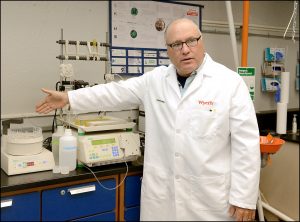Finger Lakes Community College has received $141,000 in National Science Foundation grants to study methods for extracting mushroom sugars with therapeutic properties in partnership with a Henrietta company.
FLCC faculty and students will collaborate with Empire Medicinals to find the most effective way to produce complex polysaccharides, or sugars, from mycelium, the fibrous root-like parts of mushrooms that are often below ground or in trees.

“This is a great opportunity for students to work with an industry partner and learn how to set up experiments,” said FLCC professor James Hewlett, coordinator of the college’s biotechnology program. “For the college, it could lead to more partnerships and long-term partnerships with industry.”
Hewlett is also founder of the Community College Undergraduate Research Initiative (CCURI), a national effort to teach scientific principles and skills through research. CCURI promotes collaboration among community colleges on projects to expand the number of students who have an opportunity to engage in research early in their higher education experience. FLCC will work on the mycelium project with faculty and students from Montgomery County Community College in Blue Bell, Pa.

The grants will enable FLCC to conduct experiments and pay four to five students as undergraduate researchers. In addition, FLCC scientists plan to learn from members of the Funguschain consortium in Europe, a global leader in developing products from mushroom byproducts.
Empire Medicinals cultivates organic mushrooms for the food and restaurant industry under the brand name Leep Foods. It currently grows the mushrooms on hardwood pellets, much as mushrooms in the wild derive nutrients from trees, explained Christopher Carter, co-founder of the company.
For this project, the company is hoping to use another growing medium: whey. Whey is a waste product of the dairy industry but rich in lactose, another kind of sugar. The goal is to grow the rootlike mushroom mycelium in the milk waste and turn it into a food additive.
“We want to show we can use this waste to create a food product, dry it into mycelial flour and use it in foods,” Carter said. The complex mushroom sugars are prebiotic, meaning they promote beneficial gut bacteria, and could be used to improve the health profile of a wide range of foods.
FLCC and MCCC researchers will conduct experiments to determine the most productive ways to grow and extract the sugars. For example, Hewlett said, they will try producing the sugars with different strains of mushrooms under varying temperatures and nutrient conditions.
“This is called ‘proof of concept,’” Hewlett explained. “A lot of startups do not have large budgets for research and development, so they partner with institutions.”
Sarad Parekh, who teaches Introduction to Biomanufacturing II as an adjunct instructor at FLCC, also works as a consultant with Empire Medicinals. He helped bring the company and the college together. Both Parekh and Carter see potential for biotechnology to grow in the Rochester and Finger Lakes region.
“There is an up-and-coming cluster of companies doing biomanufacturing in the Rochester area,” Carter said. Empire Medicinal’s focus on using biotechnology to innovate within the food industry makes sense in a region with major companies like Wegmans and LiDestri, he added. Involving local colleges is critical to build a biomanufacturing workforce. Major companies, Parekh said, “are very interested in getting students trained in this area.”
FLCC previously collaborated with Cheribundi to help the company learn whether storage conditions such as temperature and light could degrade the beneficial compounds in its tart cherry juice.
Students interested in learning more about FLCC’s biotechnology program or how to apply for a research position may contact Hewlett at James.Hewlett@flcc.edu.

